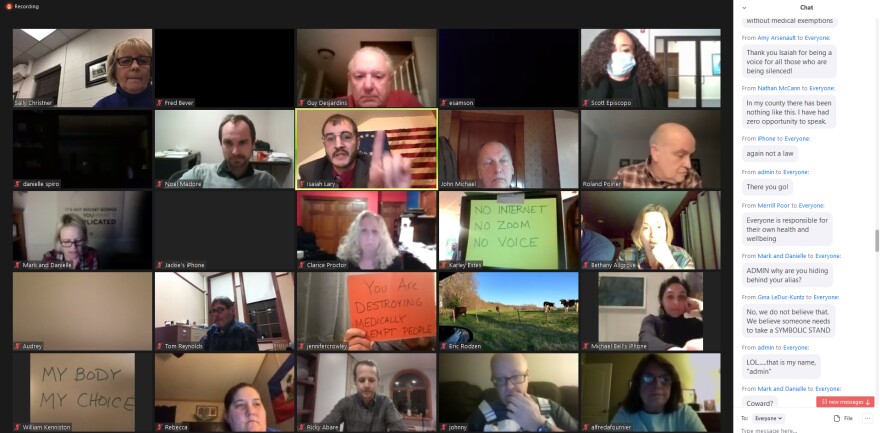The Androscoggin County Commissioners have firmly rejected an anti-masking resolution pushed by one member. But Wednesday night’s meeting also turned into a free-for-all debate over individual rights, civic responsibilities in a pandemic and public access to government.
Commissioner Isaiah Lary has sought to bar the county from enforcing executive orders by Gov. Janet Mills requiring face-coverings to be worn in some public settings. But at a virtual meeting Wednesday night, several board members said it was dishonest to suggest that county-level government has the authority to defy state mandates.
“I understand that many will not like this, I think that some in my own party will be angry with me for taking this stand. I can live with that, because I am being truthful with you,” said Sally Christner, a Republican who chairs the Commission.
Christner apologized to members of the public who have contacted her about the issue.
“The situation has raised the anxiety in your life, it’s created a lot of unrest, and frankly it’s created a lot of chaos in our community. And it’s over a motion that frankly we had no authority to begin with,” she said.
The Legislature, Christner said, is the proper place for that debate, noting that several bills to restrict the governor’s authority have been introduced there.
Lary argued the point, but in an effort to gain some support from the board, he offered an amendment calling instead to bar county funds from being used to enforce the mask requirement, and to require the county to challenge the governor’s mandates in the state’s Supreme Court.
“We do have the power to put forth an important question as a commission, there is legal precedent for that and this is something that could be done,” he said. “So I respectfully request you retract the statement there is nothing we can do. We can do something and we should as a commission speak out.”
Lary had no takers, and his was the lone vote supporting his proposals in any form. But while his efforts to dilute the state mask mandates failed, the debate broke out anew in a discussion of masking policies for workers and visitors to the county office building. Members of the public were invited to weigh in, and many did, including William Kenniston.
“We’re talking a little bit about tyranny, and how you guys do not see it? But tyranny starts small and these little steps that we’re taking are eventually going to lead to something, even if nobody wants admit that,” he said.
The debate often grew heated — mostly as Lary interrupted other board members to insist that proper procedures were not being followed. One outside government official, Lewiston planning board member and former school board chairwoman Linda Scott, said she was dismayed by the display.
“I find this utterly embarrassing. And I think there are some commissioners that should be absolutely ashamed of themselves for trying to push a personal agenda,” she said.
Mask policies for the county building were tabled for further review of medical exemptions. Late in the evening, on a split vote, the board chose to hold its next meeting in person, but while wearing masks or face shields, and allowing the public to participate under the same conditions — in-person or by Zoom.



